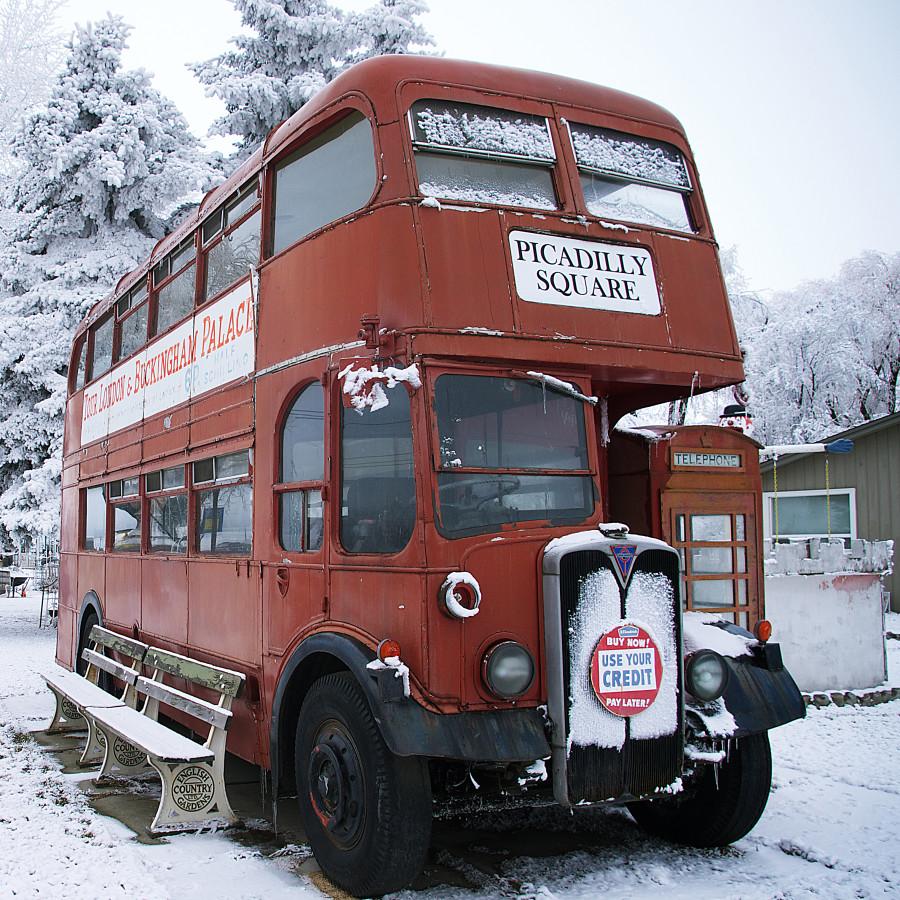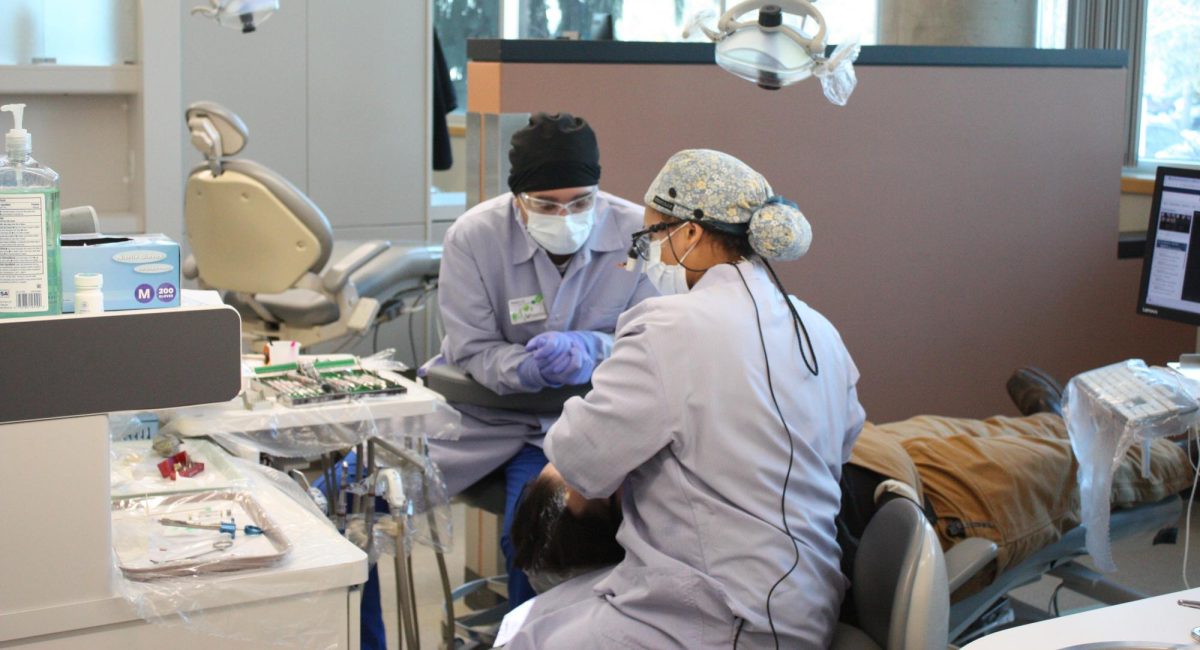Otherworldly auction house faces real-world problems
January 29, 2014
In what used to be the main office, Mike Ferguson sits surrounded by various items cluttering a darkened room, reminiscing about the days when his business flourished.
Now, any resemblance the room had to an office is hidden.
“There’s really no business to conduct,” Ferguson said.
Ferguson runs I-90 Auctions, which is visible to anyone driving from Spokane to Cheney, just before the Four Lakes/Cheney exit.
For many students making the drive to school, the cast-iron eagles on the side of the highway are a friendly reminder they are approaching the outskirts of Eagle life. Those curious enough to alter their route and venture into the inanimate zoo of marble animals and towering metal palm trees are sure to find something worth the stop.
One Eastern student who has been to the property, Mikayla Steberl, describes the scene as “a garage sale on steroids.”
But the number of people exploring this domain has been trending downward.
Most of the family-owned business’ cashflow now comes from a monthly estate auction on the first Saturday of every month, as well as smaller auctions every Wednesday which sell mostly leftovers from the larger auctions. They also do house cleanouts and estate sales around the area.
“We’re just doing anything we can for money,” Ferguson said.
Business has changed over the past decade. When the property was bought in 2004, he envisioned it as a warehouse for his retail store, Ruby Street Antiques, in Spokane. But back then, when budgets were not so tight, people were looking for decorative improvements to their home or garden, like those sold at I-90 Auctions, more often, and the property became a place for retail sales called Way Out West.
By 2007, business was booming. According to Ferguson, they sold 36 semi-trucks full of merchandise in one year.
“We were making a fortune then,” Ferguson said.
When the recession hit, homeowners and businesses could no longer afford arbors for their backyard or animal statues like those guarding the interstate.
Now, Way Out West sells one semi-truck of merchandise in a year, and Ruby Street Antiques was forced to close in 2009.
“It wiped us out by more than 90 percent,” Ferguson said.
According to Ferguson, his business is directly tied to the housing market.
An article in the Spokane Journal of Business said foreclosures hit a record high in 2013, even though other indications show more recent improvements in the market. But for a business selling antiques and garden decor for homes, high foreclosures mean bad business.
The items at I-90 Auctions are not hand-made by Ferguson. His talent is finding items to import or to manufacture, even if he is reluctant to call it a talent.
“I just see something, I like it, and I build on that idea,” Ferguson said. “It’s more of a fear of not doing something than a talent.”
He travels all around the world to places like China, Thailand and Mexico to import larger pieces, such as massive iron horses.
Mike’s brother, Mark Ferguson, handles most of the retail sales on the site as a volunteer, and he helps to maintain upkeep. Both Mike and Mark Ferguson live in separate houses where they work by the freeway, and Mark Ferguson has been by his brother’s side during this journey.
“His ideas always blow people out of the water,” Mark Ferguson said.
Eastern students may recognize the mock spaceship grounded on a bump in the field just outside of I-90 Auctions. A similar spaceship used to be on the EWU campus in front of the library a few years ago.
The idea for this spaceship design came to Mike Ferguson while he was at a trade fair. He saw something that looked like a time machine, and decided he wanted to make it look like an enclosed spaceship with a classic 1950s feel to it. From there, he took it to a manufacturing plant in China where it was produced.
He has sold about 30 of them to all sorts of people, from sci-fi enthusiasts to businesses with “Out Of This World” slogans.
However, production costs have gone so high, people who pre-order spaceships are not able receive their order.
According to Mike Ferguson, the spaceships used to be sold with a profit for $3,500. But now, with wages climbing, it now costs the same amount of money just to build one. He would have to increase the retail price to $5,000 to make any reasonable profit, which is steep for struggling homeowners or small businesses.
“Until something changes, until the economy gets better on our level, I can’t even get them a spaceship,” Mike Ferguson said.
He is most proud of the conservatories, artful greenhouses the size of a small room usually attached to a house.
The site currently has four of these exquisite English structures. Conservatories like the ones he has take 45 days for a full factory to make and cost thousands of dollars to build. The intricate metal forms were inspired by something very small: a photograph on a postcard.
“You could drive from one end of the country to another and never see another one,” Mike Ferguson said.
He sold two of these in one month in 2007, and was expecting to sell 20-30 a year.
He has not sold one since.
And the situation has the potential to get worse. According to an article in The Economist, Joerg Wuttke, an industrialist with the EU Chamber of Commerce in China, forecasts the cost of manufacturing in China possibly soaring to triple what it is now by the year 2020.
Because of the production costs, Mike Ferguson said the little guys like him are the ones hurting. Small businesses can not afford to buy small quantities anymore, and, if they buy larger quantities, they would not be able to sell that much product.
“We went from being a store to being a museum,” Mike Ferguson said.
His brother, Mark, agrees that the glory years may be behind them. He considers many of the pieces, the antiques, the 6,000-pound lions, to be luxuries.
“If you had cookie jar money, this is what you would spend it on,” Mark Ferguson said.
But he is still appreciative of what he and his brother have done.
“Many of the customers have become friends,” Mark Ferguson said. “I don’t regret any of it.”
In 2011, Mike Ferguson was forced to go back to work as a registered nurse. He worked for a couple years doing psychiatric evaluations, but quit again last August, partly because he could not manage his nursing job, the auction house and his two kids with the attention he thought they deserved.
But he is also a business-minded person, and working for a salary was too restrictive.
While he is realistic about his future prospects in this economy, he would rather work seven days a week as a junk seller and an importer from his own backyard, among antique statuary and rare structures from all over the world, if only for the small amount of hope that the business he built might return to its old form.
“I’ve made a lot of money in the past, and I know that there’s the potential for that happening again,” he said.









